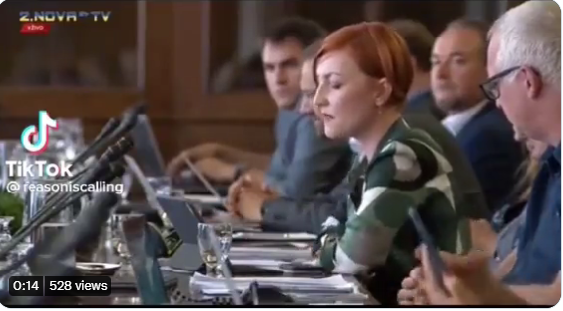By: Sara Bertoncelj / Nova24TV
“The main purpose of the bill we are proposing today is to change the way public radio-television is managed, so as to allow political subordination and interference in the staffing and editorial decisions of the public Radio-Television Slovenia,” said Asta Vrečko, Minister of Culture, at a recent meeting of the Committee on Culture. This is actually nothing new – we have known this all along, but it is nice to hear an acknowledgement of their true intentions from the side that proposed that the draft amendment to the RTV Slovenia Act be discussed under the urgent procedure, saying it would prevent “irreversible consequences for the functioning of the state.”
On Monday, the Members of Parliament confirmed the decision of the Speaker of the National Assembly to consider the coalition’s proposal for an amendment to the Radio-Television Slovenia Act under the urgent procedure. Namely, 29 MPs voted in favour of the urgent procedure, and 24 voted against it. After the extraordinary session of the National Assembly, the extraordinary session of the National Assembly’s Committee on Culture began at 2 p.m., at which the members discussed the government’s proposal for an amendment to the Radio-Television Slovenia Act and the proposal of the Slovenian Democratic Party (Slovenska demokratska stranka – SDS) for amendments to the Mass Media Act.
At the meeting of the Committee on Culture, there was a lot of nonsense, for example; professor and activist Sandra Bašič Hrvatin said that she thought public service broadcaster Radio-Television Slovenia should be run by its employees – because if we trust them with providing information, we should also entrust the running of the media outlet to them. Just how much we actually trust them to “pass on the information” to us is, of course, a matter of discussion. However, the statement of the Minister of Culture, Asta Vrečko, who admitted to the real reason for the coalition’s bill, was much more meaningful: “The main purpose of the bill we are proposing today is to change the way public radio-television is managed, so as to allow political subordination and interference in the staffing and editorial decisions of the public Radio-Television Slovenia.”
“We will persist with the strike because of the damage caused by the administrative and programme management. And at the same time, we will support systemic solutions that will reduce the influence of political power on the management and operations of Radio-Television Slovenia and allow all its employees to work autonomously,” Helena Milinkovič and Alenka Potočnik wrote in a recent column. “RTV, you are actually one big political party. You are politically defined; you act as an incubator for future left-wing politicians and as a career nursery for the privileged leftists. The only real effective depoliticisation would be to either abolish RTV or set up two television stations and introduce voluntary funding,” Domen Cukjati responded to the column in question, and he also added a list of socio-political workers from RTV who present (or used to present) themselves as independent journalists. However, he forgot to add Dejan Štamfelj to the list, who started working with Television Slovenia when he was a student and is now Vrečko’s consultant – just like Lenart J. Kučič, the editor of the “Podčrto” web portal and hunter of “right-wing trolls” on Twitter.
So now, the current government is speeding up the “depoliticisation” process of the public service broadcasting through a law that is being dealt with under the urgent procedure. Only because the majority in the Programme Council is now made up of the wrong people – those who do not necessarily agree with the long-standing policies of RTV, which were a staple of the left-wing governments. And the straw that broke the camel’s back was Uroš Urbanija, whom the Programme Council supported in his candidacy for the post of Director of the public television.
The system must now be changed by the force of law or by urgent procedure, even though it has apparently not bothered anyone for at least 16 years – if we take away the transitional crisis in 2010, when the situation was similar to the current one, and the leftists also tried to bring back their directors, councillors and, consequently, editors by force of law and by an urgent procedure. It did not work very well for them then, but times are different now, as we live in times of Freedom.
“Due to the revolutionary approach of the coalition, which would dismiss the entire management of RTV by amending the law under an emergency procedure, is a cause of concern for the Legislative and Legal Service of the National Assembly, which also warns of the constitutionally controversial nature of the government coalition’s actions,” the Siol web portal wrote, explaining that the warning in the opinion of the Legislative and Legal Service was signed by Mira Palhartinger and head of the Service, Nataša Voršič. The SDS party parliamentary group also demanded that the decision of the coalition in the Legislative Assembly of the Speaker of the National Assembly to declare a state of emergency for the dismissal of the RTV leadership should be confirmed by the entire National Assembly, as they believe that this is an example of abuse of the rules of procedure, as RTV is not actually in a state of emergency.

